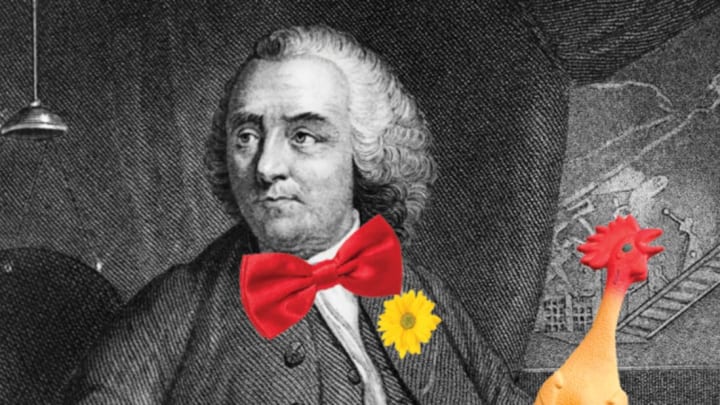As the story goes, the Continental Congress tasked Thomas Jefferson with writing the first draft of the Declaration of Independence… because they feared Ben Franklin would sneak in jokes. And with a history of pranks like these, who can blame them?
1. Silence Dogood
Ben Franklin knew all about faking it 'til you make it. At the age of 16, he apprenticed at his older brother's Boston print shop, publisher of The New-England Courant. Alas, James Franklin wasn't supportive of Ben's writing ambitions and rejected every piece he submitted. Desperate to get published—and to prove his brother wrong—the younger Franklin wrote a letter to the editor under the pseudonym Silence Dogood and slipped it under the shop's door at night. James Franklin found the middle-aged widow's social commentary humorous and, in 1722, printed 14 Dogood letters.
The letters really resonated with the community—a few eligible bachelors even mailed marriage proposals to the fictitious woman! When Ben came clean as the real Silence Dogood, James wasn't amused. But we all know who got the last laugh: Ben Franklin moved to Philadelphia and founded Poor Richard's Almanack 10 years later, while the Courant folded in 1726.
2. Titan Leeds's Death
The first edition of Poor Richard's Almanack, published in 1733, established an ongoing prank on Titan Leeds, an astrologer, competing almanac publisher, and frenemy of Ben Franklin. Under the pseudonym Poor Richard Saunders, Franklin predicted Leeds's death and encouraged readers to stick around to see if his prognostication was right. The feud that followed sold a lot of pamphlets, benefiting both publishers.
The next year, the Almanack printed an obituary for the still living Leeds and reported that the man claiming to be him was an identity thief. When Leeds actually died in 1738, Saunders commended the imposter for ending the prank once and for all. But Franklin doesn't get all the credit for this one. The hoax was inspired by Jonathan Swift, who used the pseudonym Isaac Bickerstaff to pull an enduring April Fool's Day joke on astrologer John Partridge in 1708.
3. The Speech of Miss Polly Baker
Franklin clearly enjoyed using pseudonyms, but one of his more progressive "pranks" was done completely anonymously. In 1747, he published "The Speech of Miss Polly Baker" in The General Advertiser. In it, a woman goes on trial for having an illegitimate child—a crime she's committed four other times—and wonders why the men involved were never punished. Franklin perfectly balanced humor, sex, and sympathy to both entertain readers and challenge the double standard. While many people believed Miss Baker’s was a true story, it was in fact only partially inspired by true events: Franklin himself had a son out of wedlock. Allegedly, the founding father didn't come clean as the story's author until 1777, at which time he was ambassador to France.
4. Faking the Boston Independent Chronicle
Long before The Onion, in 1782, Ben Franklin published a fake supplement to the Boston Independent Chronicle. It wasn't all in good fun—he hoped to arouse the sympathies of British citizens for the Americans who fought in the Revolutionary War in time for peace negotiations. To do so, he needed content that would get reprinted in British newspapers, and, well, sensationalism sells. The most affecting bogus story was a grisly letter detailing how the British employed Native Americans to scalp colonists. When Franklin sent the letter to correspondents, he admitted the supplement's questionable veracity, but maintained that the scalping issue was very real and warranted reporting. No one knew it was a hoax until more than 70 years later!
5. Daylight Saving Time
Satire is rooted in truth. In the essay "An Economical Project for Diminishing the Cost of Light," published in the Journal de Paris in April 1784, Ben Franklin suggested that the French could conserve 64 million pounds of candle wax if they woke up with the sun in springtime. He hilariously proposed firing cannons and ringing church bells as a sort of unavoidable alarm clock. It was a preposterous idea… until it became a reality (minus the cannons).
Today, the joke's on us. A New Zealand entomologist named George Vernon Hudson proposed the daylight savings time we temporarily loathe today in 1895. European countries adopted it in 1916, and the U.S. followed suit two years later.
6. Historicus
Franklin's last hurrah, just 25 days before his death in 1790, was to challenge slavery. In a letter to The Federal Gazette written under the name Historicus, Franklin related the fictional tale of Sidi Mehemet Ibrahim, an Algerian potentate who fought for the enslavement of Christians by Muslims in the late 1680s. The tyrant's inhumane pro-slavery arguments just so happened to echo those made by anti-abolitionist Congressman James Jackson of Georgia. Touché! Franklin didn't live to see slavery abolished, but we'd be kidding ourselves if we said he had nothing to do with it.
This piece originally ran in 2015.
